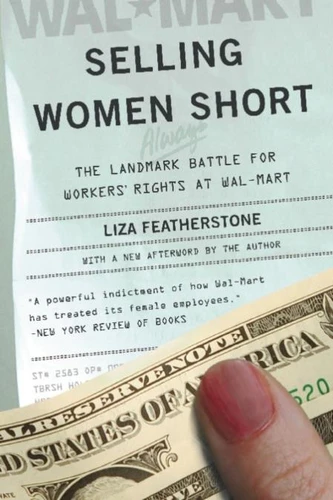Selling Women Short. The Landmark Battle for Workers' Rights At Wal - Mart
Par :Formats :
Disponible dans votre compte client Decitre ou Furet du Nord dès validation de votre commande. Le format ePub protégé est :
- Compatible avec une lecture sur My Vivlio (smartphone, tablette, ordinateur)
- Compatible avec une lecture sur liseuses Vivlio
- Pour les liseuses autres que Vivlio, vous devez utiliser le logiciel Adobe Digital Edition. Non compatible avec la lecture sur les liseuses Kindle, Remarkable et Sony
- Non compatible avec un achat hors France métropolitaine
 , qui est-ce ?
, qui est-ce ?Notre partenaire de plateforme de lecture numérique où vous retrouverez l'ensemble de vos ebooks gratuitement
Pour en savoir plus sur nos ebooks, consultez notre aide en ligne ici
- Nombre de pages304
- FormatePub
- ISBN978-0-7867-3816-8
- EAN9780786738168
- Date de parution19/04/2009
- Protection num.Adobe DRM
- Infos supplémentairesepub
- ÉditeurBasic Books
Résumé
On television, Wal-Mart employees are smiling women delighted with their jobs. But reality is another story. In 2000, Betty Dukes, a 52-year-old black woman in Pittsburg, California, became the lead plaintiff in Dukes v. Wal-Mart Stores , a class action representing 1.4 million women. In an explosive investigation of this historic lawsuit, journalist Liza Featherstone reveals how Wal-Mart, a self-styled "family-oriented, " Christian company: Deprives women (but not men) of the training they need to advance -- Relegates women to lower-paying jobs, like selling baby clothes, reserving the more lucrative positions for men -- Inflicts punitive demotions on employees who object to discrimination -- Exploits Asian women in its sweatshops in Saipan, a U.
S. commonwealth. Featherstone reveals the creative solutions Wal-Mart workers around the country have found-like fighting for unions, living-wage ordinances, and childcare options. Selling Women Short combines the personal stories of these employees with superb investigative journalism to show why women who work low-wage jobs are getting a raw deal, and what they are doing about it.
S. commonwealth. Featherstone reveals the creative solutions Wal-Mart workers around the country have found-like fighting for unions, living-wage ordinances, and childcare options. Selling Women Short combines the personal stories of these employees with superb investigative journalism to show why women who work low-wage jobs are getting a raw deal, and what they are doing about it.
On television, Wal-Mart employees are smiling women delighted with their jobs. But reality is another story. In 2000, Betty Dukes, a 52-year-old black woman in Pittsburg, California, became the lead plaintiff in Dukes v. Wal-Mart Stores , a class action representing 1.4 million women. In an explosive investigation of this historic lawsuit, journalist Liza Featherstone reveals how Wal-Mart, a self-styled "family-oriented, " Christian company: Deprives women (but not men) of the training they need to advance -- Relegates women to lower-paying jobs, like selling baby clothes, reserving the more lucrative positions for men -- Inflicts punitive demotions on employees who object to discrimination -- Exploits Asian women in its sweatshops in Saipan, a U.
S. commonwealth. Featherstone reveals the creative solutions Wal-Mart workers around the country have found-like fighting for unions, living-wage ordinances, and childcare options. Selling Women Short combines the personal stories of these employees with superb investigative journalism to show why women who work low-wage jobs are getting a raw deal, and what they are doing about it.
S. commonwealth. Featherstone reveals the creative solutions Wal-Mart workers around the country have found-like fighting for unions, living-wage ordinances, and childcare options. Selling Women Short combines the personal stories of these employees with superb investigative journalism to show why women who work low-wage jobs are getting a raw deal, and what they are doing about it.



